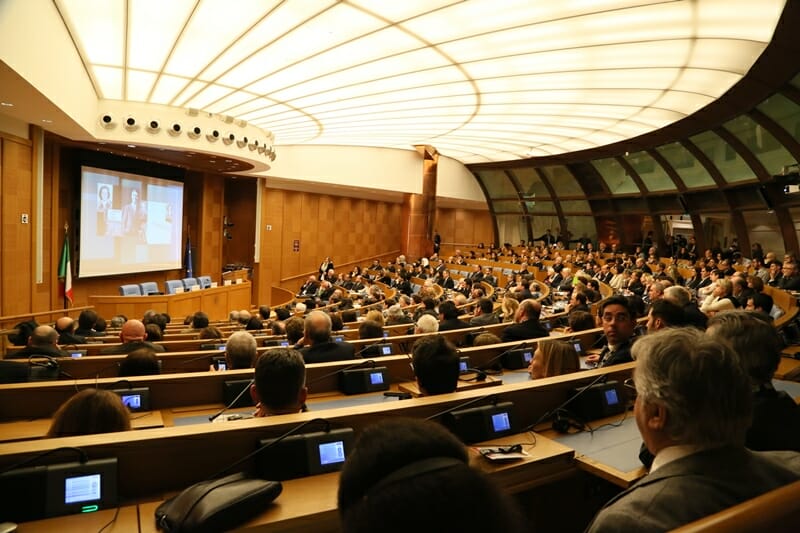 Is there a “politics that is really worth the trouble” at a time in history moment when politics is totally in crisis, often associated with corruption and special interests? This was discussed during the first of numerous worldwide events marking the 7th anniversary of Chiara Lubich (1920-2008). “Her strong and simple faith,” President of the Italian Republic, Sergio Mattarella, stated: “united to a remarkable ability to read the modern world and accept its challenges, has inspired the life of thousands of people around the world, constantly exhorting national and international institutions to promote values of brotherhood and mutual respect in families, community, and among peoples.”
Is there a “politics that is really worth the trouble” at a time in history moment when politics is totally in crisis, often associated with corruption and special interests? This was discussed during the first of numerous worldwide events marking the 7th anniversary of Chiara Lubich (1920-2008). “Her strong and simple faith,” President of the Italian Republic, Sergio Mattarella, stated: “united to a remarkable ability to read the modern world and accept its challenges, has inspired the life of thousands of people around the world, constantly exhorting national and international institutions to promote values of brotherhood and mutual respect in families, community, and among peoples.”
For the Focolare foundress, entering into politics signified responding to the call: “to the love of loves,” as she put it. A calling to which the response “is above all an act of brotherhood: one acts in favour of something public that regards others, desiring their good as if it were one’s own.” For this reason, said Focolare president Maria Voce, in her opening address to the “Chiara Lubich: Unity and Politics” gathering, “it is absolutely necessary to begin from unity, which is the only thing able to give the correct relevance to freedom and equality.”
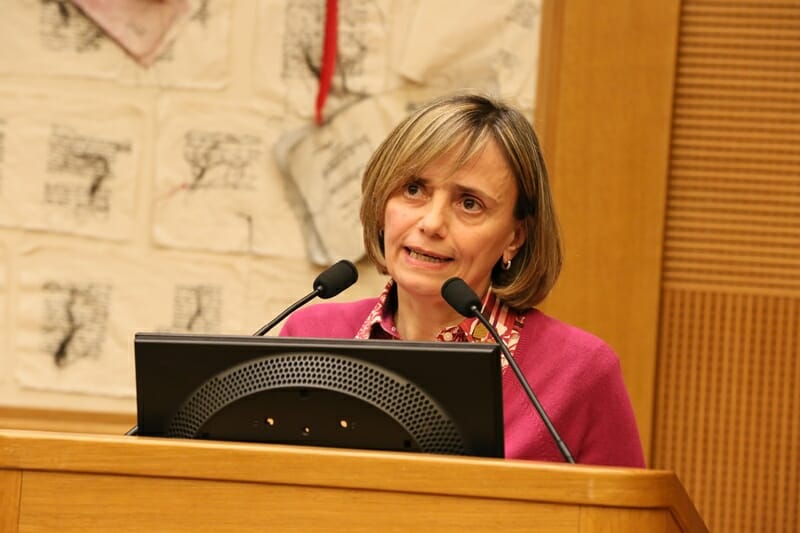 What does it mean to live universal brotherhood in such an environment? Iole Mucciconi, who plays a leadership role at the Presidency of the Council of Ministers, shared his testimony : “It is important to begin each day by committing oneself to do one’s job to the best of one’s ability. I always remember Chiara Lubich’s recommendations for living brotherhood: aim to live an honest life, with moral purity, detachment from money, sharing the joys and sorrows of your sisters and brothers.”
What does it mean to live universal brotherhood in such an environment? Iole Mucciconi, who plays a leadership role at the Presidency of the Council of Ministers, shared his testimony : “It is important to begin each day by committing oneself to do one’s job to the best of one’s ability. I always remember Chiara Lubich’s recommendations for living brotherhood: aim to live an honest life, with moral purity, detachment from money, sharing the joys and sorrows of your sisters and brothers.”
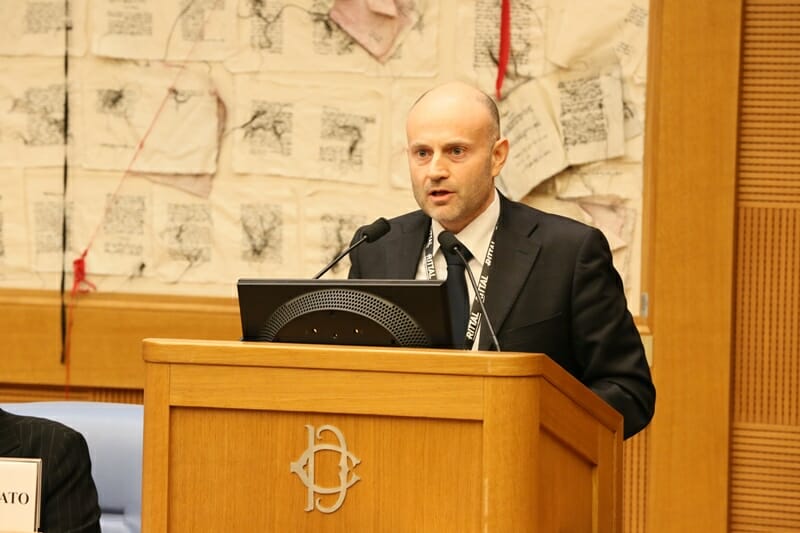 The problem of corruption, which unfortunately pervades the Italian State, was also much felt by Raffaele Scamardi, Commissioner of Public Works in the XII District of Rome at a time when magistrates and law enforcement are trying to dismantle a network of brothels that has entangled the Roman capital. “And yet, a politics in favour of others is still possible: repairing roads, listening to citizens and their need for justice, as well as working with the transparency so as to keep corruption at bay.” A similar point was made by Dieudonné Upira Sunguma, one time Civil Service Minister for the Democratic Republic of Congo, who often had to refuse gifts that were meant to corrupt him.
The problem of corruption, which unfortunately pervades the Italian State, was also much felt by Raffaele Scamardi, Commissioner of Public Works in the XII District of Rome at a time when magistrates and law enforcement are trying to dismantle a network of brothels that has entangled the Roman capital. “And yet, a politics in favour of others is still possible: repairing roads, listening to citizens and their need for justice, as well as working with the transparency so as to keep corruption at bay.” A similar point was made by Dieudonné Upira Sunguma, one time Civil Service Minister for the Democratic Republic of Congo, who often had to refuse gifts that were meant to corrupt him.
Young people of the Focolare the Italian Parliament. The tragedy of Syrian refugees in Jordan and Lebanon interrupted the morning in the parliamentary hall. The words of Lara and George were simple and sharp and hopeful as any twenty year-old’s would be. The war that is tearing Syria apart is a real drama that is being enacted before our very eyes. Abraham, on the other hand, comes from a land torn by drug trafficking: Mexico. One of the features of the 7th anniversary of Chiara Lubich’s death has been the political projects and engagement on the frontiers by young members of the Focolare. Three hundred of these young people are in Rome to attend the events, and to display their projects spread across the planet in favour of dialogue, solidarity, and peace.
When questioned about the role of politics in healing conflicts and protecting human rights, the president of the Chamber of Deputies, Laura Boldrini, was thankful for the young people’s courage in “shortening the distance between institutions and citizenry” and she asked that we “not give in to those who would change the DNA of our people, which is made of hospitality and solidarity.” She encouraged the young people to place themselves at the disposal of public affairs with generosity, in order to influence choices and decisions,” performing a service for the country and never falling flat because of an opposing sides and adversarial approach to politics, because “there is a vision of society contained in the values of Chiara Lubich, and this is politics, this is never removing yourself.”
A discussion followed about the wounds of our own times: the relationship with the Muslim world; wars and epidemics in Africa; natural disasters in Southeast Asia. Political scientist, Pasquale Ferrara, insisted that “dialogue is the weapon of the weak;” and economist Luigino Bruni spoke about huge social disparities, recalling that “the most important happiness isn’t our own, but that of others. And so it is worthwhile to become involved in finding creative solutions to problems, and joining with one another to do new things”
According to Paolo Frizzi, the communitarian sense of the projects that had been presented by the young people of the Focolare, which were monitored by the Universal Brotherhood Observatory and promoted by the United World Project, demonstrates “the anthropological and civil prospective of the charism of unity, which is capable of forging a new humanity capable of sharing projects that even begin from our very differences, in order to build things that will endure and help the world.”
“Fraternity on the way” the title chosen for the event, calls for concrete steps by politicians and citizens together.

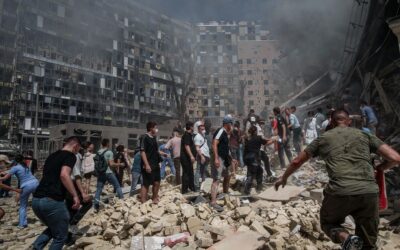
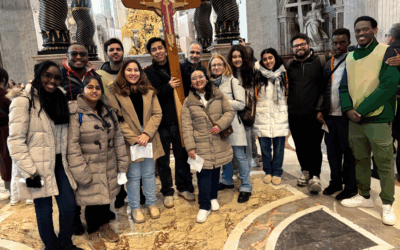
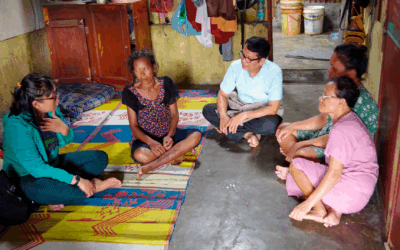
0 Comments